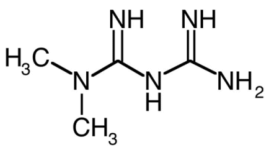A
group at McMaster University has shown an effect of the diabetes drug metformin beyond its suppression of liver glucose production that might partially explain its beneficial effects on aging and a number of diverse diseases such as cognitive disorders, cancer and cardiovascular disease. (There are currently over 1,500 registered clinical trials to test the effects of metformin in aging and different diseases.) It induces the expression and secretion of growth differentiating factor 15 (GDF15) in mouse liver cells, a protein known to suppress appetite and cause weight loss.

I'm sorely tempted to try to get myself a prescription for the stuff! Here is the technical abstract of the article:
Metformin is the most commonly prescribed medication for type 2 diabetes, owing to its glucose-lowering effects, which are mediated through the suppression of hepatic glucose production (reviewed in refs. 1,2,3). However, in addition to its effects on the liver, metformin reduces appetite and in preclinical models exerts beneficial effects on aging and a number of diverse diseases (for example, cognitive disorders, cancer, cardiovascular disease) through mechanisms that are not fully understood1,2,3. Given the high concentration of metformin in the liver and its many beneficial effects beyond glycemic control, we reasoned that metformin may increase the secretion of a hepatocyte-derived endocrine factor that communicates with the central nervous system4. Here we show, using unbiased transcriptomics of mouse hepatocytes and analysis of proteins in human serum, that metformin induces expression and secretion of growth differentiating factor 15 (GDF15). In primary mouse hepatocytes, metformin stimulates the secretion of GDF15 by increasing the expression of activating transcription factor 4 (ATF4) and C/EBP homologous protein (CHOP; also known as DDIT3). In wild-type mice fed a high-fat diet, oral administration of metformin increases serum GDF15 and reduces food intake, body mass, fasting insulin and glucose intolerance; these effects are eliminated in GDF15 null mice. An increase in serum GDF15 is also associated with weight loss in patients with type 2 diabetes who take metformin. Although further studies will be required to determine the tissue source(s) of GDF15 produced in response to metformin in vivo, our data indicate that the therapeutic benefits of metformin on appetite, body mass and serum insulin depend on GDF15.
 I'm sorely tempted to try to get myself a prescription for the stuff! Here is the technical abstract of the article:
I'm sorely tempted to try to get myself a prescription for the stuff! Here is the technical abstract of the article:

